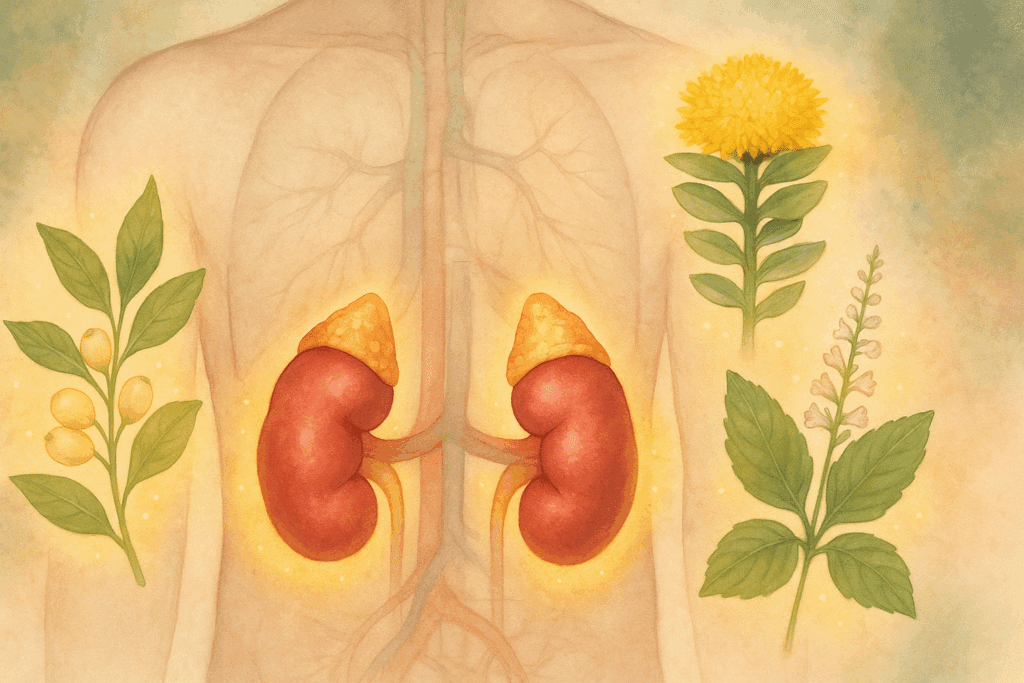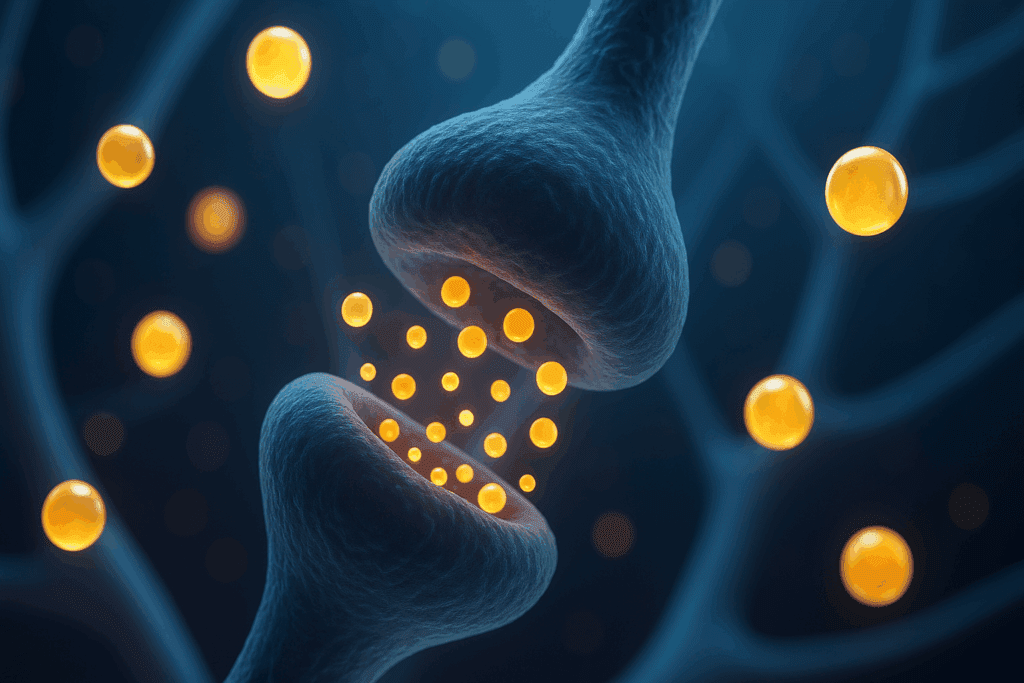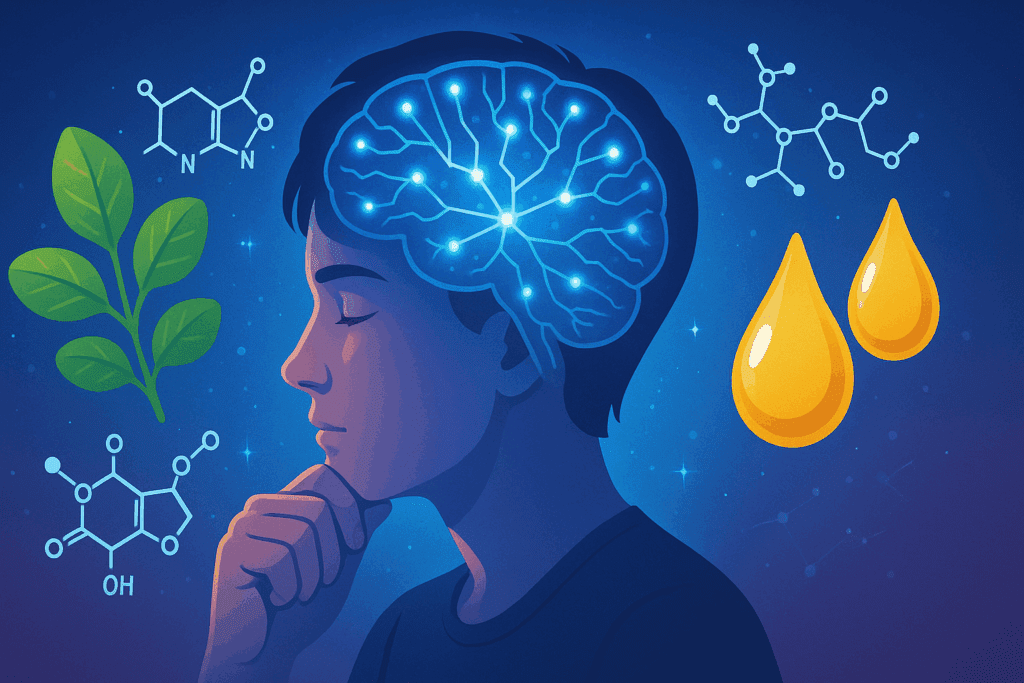In today’s fast-paced world, the prevalence of chronic stress and anxiety continues to rise, prompting an urgent need for holistic, scientifically validated interventions that target not only the mind but the body’s intricate physiological systems. Among these, the nervous system remains central to emotional and physical resilience, making it imperative to explore nervous system support supplements that provide comprehensive, sustainable relief. As the conversation around mental health grows increasingly nuanced, so too does the demand for advanced adaptogenic solutions that nurture the body’s internal equilibrium while enhancing cognitive clarity, emotional balance, and physical stamina.
Adaptogens represent a unique class of botanicals and fungi that bolster the body’s ability to resist stressors of all kinds—be they physical, emotional, or environmental. These natural substances have been used for centuries in traditional healing systems such as Ayurveda and Traditional Chinese Medicine, yet they are only recently gaining recognition in Western integrative health for their scientifically supported capacity to modulate stress responses and restore homeostasis. What makes adaptogens especially compelling is their dual action: they gently support adrenal function while concurrently stabilizing neurotransmitter activity, thereby creating a harmonious state within the central and peripheral nervous systems.
This article explores the transformative potential of adaptogenic mushrooms, herbs, and micronutrients as nervous system support supplements. From ashwagandha and lion’s mane to magnesium and B-complex vitamins, we will dissect the mechanisms, research findings, and therapeutic applications of these agents, providing a deep dive into how they synergistically contribute to stress relief and cognitive enhancement. Designed for a college graduate-level audience, this guide brings together evidence-based insights, practical advice, and advanced health literacy to inform and empower readers in making informed decisions about their nervous system health.
You may also like: Unlock Powerful Stress-Relief with Adaptogenic Mushrooms and Stamina Herbal Support
Understanding the Role of the Nervous System in Stress Regulation
The human nervous system, comprising the central nervous system (CNS) and peripheral nervous system (PNS), orchestrates a wide array of physiological responses to internal and external stimuli. At the heart of stress regulation lies the hypothalamic-pituitary-adrenal (HPA) axis, a neuroendocrine network that governs the body’s hormonal response to stress. When the brain perceives a threat, it initiates a cascade of biochemical events: cortisol is released, heart rate accelerates, and glucose surges into the bloodstream to provide immediate energy.
While these responses are adaptive in acute situations, chronic activation of the HPA axis can result in profound dysregulation. Prolonged cortisol exposure impairs hippocampal function, disrupts circadian rhythms, weakens immune defense, and leads to fatigue, anxiety, and even depression. In this context, the nervous system is not merely a passive conduit for stress but a dynamic participant in how stress manifests and persists.
Crucially, nervous system support supplements are designed to counterbalance this dysregulation by nourishing the neuroendocrine pathways, enhancing neuroplasticity, and supporting neurotransmitter synthesis. Effective interventions address both immediate symptom relief and long-term nervous system resilience. A well-rounded strategy combines adaptogenic botanicals with micronutrients that fortify nerve tissue, regulate mood, and stabilize hormonal activity.

Why Adaptogenic Mushrooms Deserve Special Attention
Within the pantheon of adaptogens, mushrooms occupy a particularly compelling niche. Fungi like lion’s mane, reishi, and cordyceps offer a broad spectrum of bioactive compounds including polysaccharides, triterpenes, and hericenones that exert powerful effects on the nervous system. Lion’s mane (Hericium erinaceus), for example, has been shown to stimulate nerve growth factor (NGF) synthesis—a protein essential for the growth, maintenance, and survival of neurons.
The neurotrophic properties of lion’s mane make it one of the most promising nervous system supplements available today. Clinical studies have demonstrated its capacity to enhance cognitive function, improve memory recall, and reduce symptoms of anxiety and depression. In aging populations, lion’s mane supplementation has been linked to improved neurogenesis and potential slowing of neurodegenerative processes such as Alzheimer’s disease.
Reishi mushroom (Ganoderma lucidum), on the other hand, is celebrated for its calming, immune-regulatory, and hepatoprotective properties. Its active compounds work by modulating the central nervous system and lowering excitotoxic responses, which can lead to burnout or nervous exhaustion. Cordyceps adds yet another dimension, improving mitochondrial efficiency and oxygen utilization, which indirectly benefits the nervous system by reducing systemic fatigue and enhancing energy metabolism.
Together, these mushrooms form a potent triad of adaptogenic support for individuals grappling with chronic stress, cognitive fog, or emotional instability. They are not merely tools for symptomatic relief but integral components of a broader nervous system optimization strategy.

Powerful Nervous System Support Supplements That Target Adrenal Health
A cornerstone of any effective stress relief protocol is the regulation of adrenal function. The adrenal glands produce cortisol and adrenaline, which, when chronically elevated, contribute to nervous system imbalances. Adaptogens such as ashwagandha (Withania somnifera), rhodiola rosea, and holy basil (Ocimum sanctum) have garnered extensive clinical attention for their ability to recalibrate adrenal output and buffer the physiological toll of stress.
Ashwagandha stands out as one of the most thoroughly researched adaptogenic herbs, demonstrating efficacy in reducing cortisol levels, enhancing thyroid function, and improving sleep quality. Unlike synthetic sedatives, ashwagandha offers a gentle modulation of the stress response without inducing dependency or cognitive dulling. Its anxiolytic properties make it an ideal candidate for those seeking natural nervous system support supplements that do not compromise alertness or functionality.
Rhodiola rosea works on a slightly different axis. Native to cold, mountainous regions, this herb enhances resilience to both physical and mental fatigue. It improves mitochondrial ATP production and modulates serotonin and dopamine activity, thereby exerting a dual-action effect on energy metabolism and mood regulation. Holy basil, often referred to as “the elixir of life” in Ayurvedic tradition, provides anti-inflammatory and adaptogenic benefits that support both cardiovascular and nervous system health.
What distinguishes these herbs is their ability to promote balance rather than blunt force intervention. They do not merely suppress symptoms but engage with the body’s intrinsic regulatory systems to foster genuine homeostasis.

How Nervous System Support Supplements Enhance Neurotransmitter Balance
Neurotransmitters are chemical messengers that facilitate communication between neurons. They regulate mood, cognition, sleep, and motor function. Imbalances in neurotransmitter levels—such as serotonin, dopamine, GABA, and norepinephrine—are often implicated in anxiety, depression, and sleep disorders. Nervous system support supplements play a vital role in maintaining this delicate balance.
Magnesium is one of the most crucial minerals in this context. It serves as a cofactor in over 300 enzymatic reactions, many of which involve neurotransmitter synthesis and neuromuscular signaling. Magnesium glycinate and threonate, in particular, have demonstrated superior bioavailability and effectiveness in crossing the blood-brain barrier. These forms of magnesium contribute to enhanced GABA activity, improved sleep architecture, and reduced symptoms of anxiety.
Another foundational supplement is L-theanine, an amino acid found in green tea. It promotes alpha brainwave activity, fostering a calm but alert mental state. L-theanine enhances GABA and dopamine levels while simultaneously attenuating the stimulating effects of caffeine. This makes it particularly useful for individuals experiencing high-stress occupations or academic environments where focus and calm must coexist.
B-complex vitamins also merit attention. These water-soluble nutrients are integral to the synthesis of serotonin, dopamine, and norepinephrine. They facilitate methylation, a biochemical process essential for detoxification and neurotransmitter production. Deficiencies in B6, B9 (folate), and B12 are commonly linked to mood disorders and cognitive decline, underscoring the importance of incorporating these vitamins good for the nervous system into a daily regimen.

The Emerging Role of Nootropics in Stress and Anxiety Relief
Nootropics, also known as cognitive enhancers, are a newer category of nervous system supplements that aim to improve mental clarity, memory, and stress resilience. While some nootropics are synthetic, many natural agents also fall under this umbrella. These include compounds such as bacopa monnieri, phosphatidylserine, and omega-3 fatty acids, all of which have shown promise in supporting neurological function and emotional stability.
Bacopa monnieri, a staple in Ayurvedic medicine, contains saponins known as bacosides that have been shown to improve synaptic communication and reduce the degradation of acetylcholine. Clinical trials indicate that bacopa enhances memory recall, reduces anxiety, and protects against neuroinflammation. Phosphatidylserine, a phospholipid component of neuronal cell membranes, facilitates efficient signal transduction and supports cortisol modulation, making it particularly beneficial in high-stress scenarios.
Omega-3 fatty acids, particularly EPA and DHA, are well-known for their anti-inflammatory properties and their role in maintaining neuronal membrane integrity. Supplementing with high-quality fish oil can improve mood, reduce systemic inflammation, and support neuroplasticity—the brain’s ability to adapt and reorganize itself in response to stress or injury.
These nootropic agents, when used judiciously, can complement traditional adaptogens and micronutrients to create a multifaceted nervous system support protocol. They are especially relevant for individuals engaged in cognitively demanding tasks or those recovering from stress-related burnout.
Integrating Nervous System Support Supplements into a Daily Routine
To reap the full benefits of nervous system support supplements, consistency and personalization are key. The effectiveness of any supplement protocol hinges on dosage, timing, and individual biochemistry. For instance, adaptogenic herbs like ashwagandha or rhodiola are best taken in the morning or early afternoon to align with natural cortisol rhythms, while magnesium and L-theanine may be more suitable for evening use due to their calming effects.
It is also essential to consider potential interactions with medications, especially in individuals with pre-existing health conditions. Consulting with a licensed integrative or functional medicine practitioner can help tailor a supplementation strategy that is both safe and effective. Laboratory testing to assess micronutrient levels, neurotransmitter imbalances, and adrenal function can provide valuable data for customization.
Moreover, supplementation should never be viewed in isolation. Optimal nervous system health is achieved through a synergistic approach that includes nutrient-dense diet, regular physical activity, mindfulness practices, and sufficient sleep. Supplements serve as accelerators or correctors within this larger framework, not standalone solutions.

Practical Strategies to Maximize the Benefits of Nervous System Supplements
Once a supplementation plan is in place, certain lifestyle practices can significantly enhance its effectiveness. Mindful breathing techniques such as box breathing or diaphragmatic breathing stimulate the vagus nerve, which regulates parasympathetic activity and promotes a state of relaxation. Combining these techniques with nervine supplements like valerian root or passionflower can produce a compounded effect on anxiety reduction and sleep improvement.
Nutritional strategies also play a critical role. A diet rich in omega-3 fatty acids, antioxidants, and anti-inflammatory spices like turmeric can amplify the benefits of nervous system supplements. Conversely, excessive consumption of caffeine, sugar, and processed foods can negate progress by exacerbating excitatory neurotransmitter activity and promoting systemic inflammation.
Another often overlooked element is movement. Engaging in moderate aerobic exercise or practices like tai chi and yoga not only boosts endorphin levels but also increases BDNF (brain-derived neurotrophic factor), a protein associated with neurogenesis and mood regulation. Physical activity acts as a natural adjunct to adaptogenic supplementation by reinforcing the body’s innate capacity for resilience.
Real-World Success Stories and Emerging Research
The real-world efficacy of nervous system support supplements is increasingly validated by both anecdotal reports and peer-reviewed research. For example, a 2019 randomized controlled trial published in the Journal of Alternative and Complementary Medicine found that subjects who took a standardized extract of ashwagandha for eight weeks experienced a significant reduction in cortisol levels and self-reported stress scores compared to placebo.
Similarly, a double-blind study on lion’s mane published in Biomedical Research showed marked improvements in cognitive function among older adults over a 16-week period, suggesting its role in promoting healthy neuroplasticity. These findings are mirrored in countless case reports from practitioners who have observed dramatic improvements in mood stability, sleep quality, and energy levels among clients who adopted a targeted supplementation approach.
Emerging areas of investigation include the gut-brain axis and its role in nervous system regulation. Supplements like probiotics and prebiotics are now being explored for their potential to influence neurotransmitter activity via modulation of the gut microbiome. This integrative perspective reinforces the idea that nervous system support must be multifaceted and dynamic.
The Future of Stress Relief: Intelligent, Personalized Interventions
As the science of integrative health continues to evolve, the future of stress relief lies in precision and personalization. Advances in genomic testing, wearable technology, and biofeedback tools will soon enable individuals to fine-tune their nervous system support protocols in real time. Rather than relying on generic recommendations, consumers will have access to customized supplement stacks informed by genetic predispositions, lifestyle factors, and real-time biomarker data.
Artificial intelligence and machine learning are poised to revolutionize how we understand the intricate interplay between stress, neurochemistry, and supplementation. Algorithms capable of analyzing vast datasets will offer predictive insights into which combinations of adaptogens, nootropics, and micronutrients are most effective for specific nervous system imbalances. This emerging paradigm represents a shift from reactive to proactive health management.
Frequently Asked Questions: Nervous System Support Supplements and Adaptogenic Strategies
What lifestyle habits can enhance the effects of nervous system support supplements?
Incorporating nervous system support supplements into a broader wellness lifestyle amplifies their effectiveness considerably. Daily exposure to natural sunlight helps regulate circadian rhythms, which directly benefits mood and neurological resilience. Practices such as digital detoxing, where you limit screen time and eliminate blue light exposure before bedtime, can synergize with calming supplements like magnesium and L-theanine. Journaling or engaging in gratitude practices can also modulate the HPA axis over time, reducing cortisol and supporting emotional regulation. These habits, in conjunction with the best supplements for nervous system health, create an internal environment where cognitive clarity and emotional equilibrium flourish.
Are there any emerging trends in nervous system supplements that show promising results?
Yes, several novel developments are gaining traction in the supplement landscape. For instance, liposomal delivery systems are improving the bioavailability of critical nutrients like vitamin B12 and magnesium threonate, making them more efficient at crossing the blood-brain barrier. Additionally, postbiotics—metabolic byproducts of probiotics—are being explored for their potential role in the gut-brain axis, indirectly influencing neurotransmitter balance. Adaptogens are also being combined with functional nootropics in personalized supplement stacks tailored via genetic testing. These innovations indicate that the future of nervous system supplements lies in personalization and targeted delivery rather than one-size-fits-all solutions.
How do nervous system support supplements interact with mental health therapies?
When used responsibly, nervous system support supplements can complement cognitive-behavioral therapy (CBT), mindfulness-based stress reduction (MBSR), and other psychological interventions. Supplements that stabilize neurotransmitters, such as B-complex vitamins or omega-3 fatty acids, may create a more receptive mental state that enhances therapeutic outcomes. For individuals with treatment-resistant anxiety or depression, natural agents like saffron or SAMe may help bridge biochemical gaps while traditional therapy continues. However, it’s vital to consult healthcare professionals to ensure there are no contraindications with prescribed psychotropic medications. In integrative care models, supplements and therapy often work best together, addressing both physiological and psychological dimensions of mental wellness.
What should I consider when choosing the best supplements for nervous system health?
The best supplements for nervous system support should align with your individual biochemistry, health history, and lifestyle needs. It’s wise to choose supplements with clinically supported dosages and bioavailable forms—for example, methylated B vitamins or chelated magnesium. Look for products tested by third-party labs to confirm purity and potency. If stress manifests primarily through insomnia, supplements containing adaptogenic herbs like ashwagandha paired with nervines like lemon balm may be most appropriate. Conversely, those seeking enhanced cognitive performance might benefit more from lion’s mane or phosphatidylserine. Personalization, quality, and compatibility with your broader wellness regimen are key to optimizing results.
How do I know if nervous system supplements are working for me?
Unlike fast-acting pharmaceuticals, nervous system support supplements often take time to exert their full effects. Improvements may first be noticed in subtle areas such as improved sleep quality, reduced irritability, or enhanced focus. Journaling your symptoms and energy levels over several weeks can help you identify patterns and measure progress. Biomarkers like cortisol levels or heart rate variability, measured through wearable devices or lab testing, can also offer quantitative feedback. Ultimately, a holistic evaluation—tracking mental, emotional, and physical changes—is the most reliable way to determine whether your chosen supplements are yielding tangible benefits.
How can nervous system supplements support long-term brain health?
Nervous system supplements play a critical role in supporting neuroprotection and cognitive longevity. Compounds like curcumin, alpha-lipoic acid, and acetyl-L-carnitine help counteract oxidative stress and inflammation, two major contributors to neurodegenerative diseases. Additionally, lion’s mane mushroom is being studied for its ability to stimulate NGF (nerve growth factor), which supports synaptic repair and neuroplasticity. Over the long term, consistent intake of these compounds may help preserve memory, executive function, and emotional regulation, especially when combined with brain-healthy practices like learning new skills or engaging in social activity. The synergy between mental stimulation and proper supplementation creates a strong foundation for lifelong cognitive wellness.
What are the most overlooked vitamins good for the nervous system?
While many people know about B-complex vitamins, several lesser-known nutrients also play pivotal roles in nervous system health. Choline, a precursor to the neurotransmitter acetylcholine, is essential for memory formation and muscle control but is often under-consumed in modern diets. Vitamin D3, beyond its skeletal functions, is a neurosteroid involved in mood regulation and inflammation control. Selenium supports glutathione production, a key antioxidant in brain tissue. Vitamin K2, although better known for cardiovascular benefits, may also influence brain calcium homeostasis and cognitive function. Including these often-overlooked vitamins good for the nervous system in your regimen can address subtle deficiencies that undermine mental performance.
How do nervous system support supplements impact academic and professional performance?
In both academic and high-performance work settings, nervous system support supplements can provide a significant edge. Adaptogens like rhodiola rosea may improve resilience under deadline pressure, while L-theanine helps sustain calm focus during prolonged tasks. Nootropic agents such as CDP-choline or bacopa monnieri can enhance memory encoding and retrieval, valuable for students or professionals in cognitively demanding roles. Additionally, magnesium and vitamin B6 can support stable mood and energy, preventing burnout during intense periods. The ability to remain mentally agile and emotionally grounded often stems from a well-nourished nervous system—one that is supported both nutritionally and through mindful lifestyle practices.
Can nervous system supplements be used during pregnancy or breastfeeding?
The use of nervous system supplements during pregnancy or lactation should be approached with caution and under strict medical supervision. Some adaptogens like ashwagandha and rhodiola are not recommended during pregnancy due to their hormonal and uterine-stimulating properties. However, certain nutrients—such as magnesium, B-complex vitamins, and DHA—may be beneficial and are often included in prenatal formulations. It’s essential to distinguish between general wellness supplements and those specifically formulated for maternal health. When in doubt, consult with an OB-GYN or integrative practitioner to ensure both safety and efficacy for the mother and developing child.
How can I safely combine different nervous system support supplements?
Combining multiple nervous system supplements can yield synergistic benefits, but it requires thoughtful planning. Begin by identifying your primary goals—whether it’s reducing anxiety, improving focus, or enhancing sleep. From there, choose compounds with complementary mechanisms. For instance, pairing ashwagandha with magnesium and L-theanine may provide balanced stress relief without sedation. Always check for potential interactions, especially with SSRIs or benzodiazepines, as some supplements can amplify or interfere with these medications. Periodic cycling and dosage adjustments based on your body’s feedback help maintain effectiveness while minimizing the risk of habituation.
Why Personalized Use of Nervous System Support Supplements Matters More Than Ever
Given the complexity of stress-related conditions and neurochemical individuality, one-size-fits-all approaches are becoming outdated. Personalized supplementation based on genetic markers, lab tests, and lifestyle factors is quickly becoming the gold standard in integrative medicine. For instance, individuals with MTHFR mutations may need methylated folate instead of folic acid to support neurotransmitter synthesis effectively. The rise of AI-driven wellness platforms is making it easier to customize supplement regimens that evolve with your physiological changes. Nervous system support supplements offer their greatest benefits when aligned with your unique biology, goals, and feedback loops—a strategy that ensures long-term, sustainable mental well-being.
Conclusion: Building Resilience with Powerful Nervous System Support Supplements
In a world increasingly defined by rapid change, information overload, and chronic stressors, the need for effective, evidence-based interventions has never been more pressing. Nervous system support supplements, particularly those rooted in the adaptogenic and nootropic traditions, offer a scientifically grounded pathway toward resilience, clarity, and emotional stability. By targeting the physiological underpinnings of stress and cognitive function, these supplements provide more than temporary relief—they offer the foundation for sustainable well-being.
As our understanding of neurobiology deepens, it becomes clear that no single intervention holds all the answers. Rather, it is the thoughtful integration of powerful botanicals, strategic micronutrients, and lifestyle interventions that creates a comprehensive, personalized approach to nervous system health. Whether through the neurotrophic power of lion’s mane, the cortisol-lowering effects of ashwagandha, or the calming influence of magnesium and L-theanine, these tools equip us to navigate life with greater composure and vitality.
Ultimately, the goal is not merely to suppress symptoms but to cultivate an internal environment that supports regeneration, adaptability, and peace. With continued research, innovation, and individualized application, nervous system support supplements will remain at the forefront of modern stress-relief solutions—not as a panacea, but as a vital component of a balanced, empowered life.
Further Reading:
The role of vitamins for nervous system health
7 Supplements that Nurture the Nervous System
8 Supplements that Can Help Reduce Anxiety, According to a Psychiatrist
